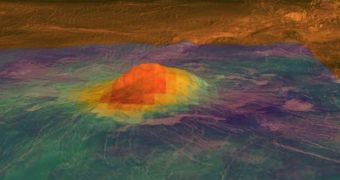Using data collected recently by the European Space Agency's (ESA) Venus Express orbiter, researchers determined that the surface of our neighboring planet may still exhibit signs of volcanic activity. Hot spots of eruption and gas release may exist at several locations throughout Venus, the team behind the new study says. This survey may help planetary scientists get more clues of the inner dynamics and composition of the planet, and could also help them make sense of how resurfacing processes occurred here over the last billion years or so, Space reports.
According to investigators, the volcanic events going on Venus may be very similar in nature to the ones that led to the formation of the Hawaii Archipelago back on Earth. Detailed analysis of how they progress over time could also yield more knowledge on how the climate on Venus changed, and maybe even on how our planet's climate does the same, and why. Initially, the first signs of volcanic activity were recorded by the NASA Magellan spacecraft, which achieved orbital insertion in 1990.
All telltale signs of volcanism were there, the team says. The readings showed that volcanic centers and topography elevations were accompanied by changes in the signature of the gravitational pull those particular locations exerted. It was additionally determined that the structures might in fact be a lot younger than initially estimated. Knowing whether the surface of Venus is still active has been a major subject of debate in the international astronomical community for many years, researchers presenting numerous studies on this issue.
“We were getting warm there, but not actually hot,” states of the new findings expert Suzanne Smrekar, who is based at the NASA Jet Propulsion Laboratory (JPL), in Pasadena, California. She was also a member of the science group that analyzed the recent readings sent back by the Venus Express probe. “We're kind of going from warm, warmer, warmest to maybe really hot,” the scientist adds, saying that Venus is “a great laboratory for understanding terrestrial planets. What's really the anomaly [among these planets] – is it Venus, or is it the Earth?”

 14 DAY TRIAL //
14 DAY TRIAL //